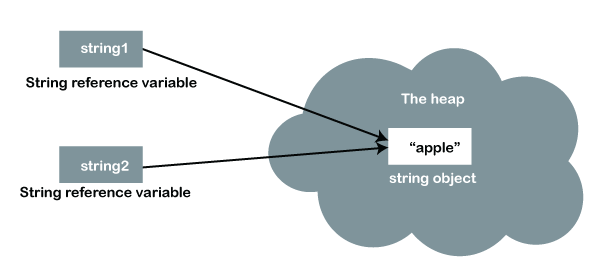Checking Out the Advantages of Immutable Strings in Modern Shows Paradigms
In the realm of modern-day shows paradigms, the principle of immutable strings stands as a keystone of durable software application development. The benefits they supply go beyond simple ease; they essentially modify the way information is handled within applications. By taking on unalterable strings, developers can make sure improved information integrity, enhanced thread safety, streamlined debugging procedures, increased safety and security procedures, and reliable efficiency optimization. These benefits offer as a testimony to the extensive impact that embracing immutability can have on the integrity and effectiveness of software application systems.
Enhanced Data Integrity

By preventing the alteration of string objects, immutability eliminates the danger of unintentional changes to the data they hold. This not just boosts the safety of the information however likewise boosts the integrity of the code that counts on these strings.
Immutability likewise sustains more secure multithreading atmospheres, as concurrent accessibility to immutable strings does not present the threat of data corruption with simultaneous alterations. This property simplifies the procedure of managing strings in parallel programming situations.
In significance, immutability acts as a safety guard around the information kept within strings, boosting their stability by making certain that when defined, their values remain the same throughout the program's implementation.

Improved Thread Security
Immutable strings boost the thread security of programs by ensuring that once a string object is created, its worth can not be customized. This residential or commercial property gets rid of the threat of simultaneous threads attempting to customize the exact same string concurrently, which might bring about data corruption or irregular states in the program - Why are strings immutable in Java?. In a multi-threaded atmosphere, where multiple strings accessibility and adjust data concurrently, the immutability of strings supplies a level of security by ensuring that the data continues to be unchanged throughout its lifecycle
Streamlined Debugging Procedures
Offered the improved string safety and security promoted by immutable strings, a substantial advantage develops in the realm of streamlined debugging procedures. Immutable strings, when developed, can not be modified, making it simpler to map the flow of data and identify the source of bugs in a program. This immutability guarantees that strings remain consistent throughout the implementation of the program, lowering the possibility of unforeseen changes that can cause errors.
When debugging with mutable strings, programmers usually encounter concerns where a string's value is changed unintentionally, making it challenging to pinpoint the origin of a pest. Nevertheless, with unalterable strings, the information remains unmodified, enabling developers to focus on analyzing the actual reasoning of the code rather than locating where and when a string was changed improperly.
Furthermore, unalterable strings simplify the debugging procedure by making it possible for less complicated recreation of pests. Considering that unalterable strings do not change state, programmers can recreate and study pests better, resulting in quicker identification and resolution of problems within the codebase. This streamlined debugging workflow eventually adds to greater software quality and improved general development performance.

Enhanced Safety And Security Actions
Enhancing information protection and fortifying system honesty, the utilization of immutable strings in software applications adds considerably to raised safety and security steps. Immutable strings additionally play a vital function in protecting against usual protection susceptabilities such as buffer overflows and SQL injection strikes, as efforts to manipulate string information at runtime are naturally restricted.
In addition, the immutability find out of strings boosts the predictability of program behavior, making it easier to verify inputs and protect against unexpected changes that could jeopardize safety and security. This predictability streamlines the process of auditing websites and verifying code, allowing designers to recognize prospective security technicalities much more effectively. Generally, integrating unalterable strings into software growth practices not just boosts the effectiveness and dependability of applications but also reinforces their strength versus protection dangers.
Reliable Performance Optimization
When dealing with mutable strings, procedures like concatenation or substring development often result in the development of new string items, leading to memory expenses and increased processing time. By enabling strings to remain consistent and unchangeable, unalterable strings facilitate much better memory management and caching chances, ultimately enhancing the total performance of the software application.
Considering that immutable strings can not be modified when developed, they can be shared across threads without the threat of unanticipated changes, decreasing the need for synchronization devices and boosting concurrency. Immutable strings streamline debugging procedures as developers can trust that a string's value will remain constant throughout the program's implementation, getting rid of prospective mistakes triggered by mutable state adjustments.
Conclusion
In final thought, the advantages of using unalterable strings in modern-day shows standards can not more information be overstated. Boosted information honesty, improved thread security, simplified debugging processes, enhanced security steps, and reliable efficiency optimization all add to the general effectiveness of programs jobs. By integrating unalterable strings into programs methods, developers can gain from a more reliable and robust codebase.
Immutability, a crucial feature of strings in shows languages such as Java and Python, makes certain that once a string object is created, it can not be modified or customized.Unalterable strings enhance the string security of programs by making sure that when a string things is created, its worth can not be customized. Unalterable strings also play a vital duty in avoiding typical safety and security vulnerabilities such as barrier overflows and SQL injection assaults, as attempts to manipulate string information at runtime are inherently limited.
By allowing strings to continue to be stable and continuous, immutable strings promote far better memory monitoring and caching chances, ultimately enhancing the total performance of the software program.
Unalterable strings streamline debugging procedures as developers can rely on that a string's worth will remain regular throughout the program's execution, eliminating possible mistakes caused by mutable state adjustments.